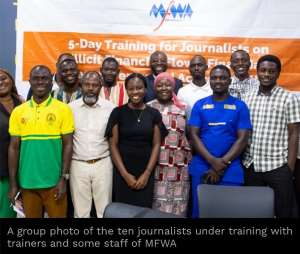
Ada, Ghana – The Media Foundation for West Africa (MFWA), in collaboration with the Thomson Reuters Foundation UK, successfully organized a five-day intensive residential training program on Illicit Financial Flows (IFFs) for ten journalists from across Ghana. Held from March 17 to March 21, 2025, at the scenic Aqua Safari Resort in Ada, Greater Accra Region, this initiative marks the second training session on IFFs organized by MFWA and the Thomson Reuters Foundation UK. The program reinforces their commitment to equipping journalists with the knowledge and skills necessary to tackle this critical economic challenge.
The training was expertly led by Cris Chinaka, a seasoned pan-African journalist, former Reuters staff from Zimbabwe, and a recognized expert on illicit financial flows. Given the covert nature of IFFs, the sessions emphasized the need for advanced investigative journalism skills to expose and report on these financial crimes effectively. Participants were trained in investigative journalism, and areas like money laundering, corruption, and the various channels through which illicit financial flows occur.
A significant portion of the training explored key sectors where illicit financial flows are most prevalent, including the extractive and mining industries, real estate, and cross-border trade. Supporting Chinaka were other expert facilitators who delivered insightful sessions on public finance management, tax evasion, trade misinvoicing, and financial transparency. Additionally, participants were introduced to platforms that provide legal support for journalists, ensuring they are well-equipped to navigate legal challenges while reporting on financial crimes.
Illicit financial flows remain a major impediment to economic development in Ghana and across Africa. The loss of substantial government revenue due to these unlawful transactions hampers the ability of governments to fund essential developmental projects aimed at improving citizens’ livelihoods. A critical takeaway from the training was the disproportionate impact of IFFs on gender equality. While illicit financial activities affect society as a whole, women often bear the brunt of the economic and social consequences, exacerbating existing inequalities.
The training brought together a diverse group of journalists, with representation from various regions across Ghana, ensuring both male and female voices were included in the discussions. By the end of the program, participants had gained invaluable knowledge and practical skills to investigate and report on illicit financial flows, corruption, and money laundering, thereby contributing to greater financial accountability and transparency in Ghana.
As part of its ongoing commitment to strengthening investigative journalism, the Media Foundation for West Africa has announced plans to follow up with additional training sessions. These forthcoming sessions will further equip journalists with the necessary tools to continue their impactful work in uncovering illicit financial activities and advocating for financial integrity within the country and beyond.
This initiative underscores the crucial role of journalism in the fight against illicit financial flows and highlights the importance of continued capacity-building efforts to empower the media in addressing one of the most pressing socio-economic challenges of our time.


